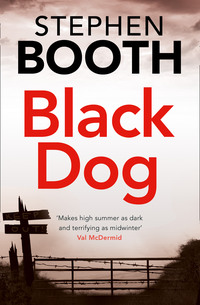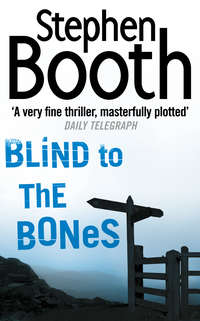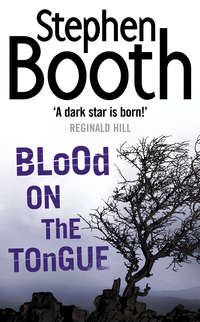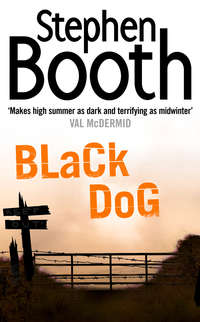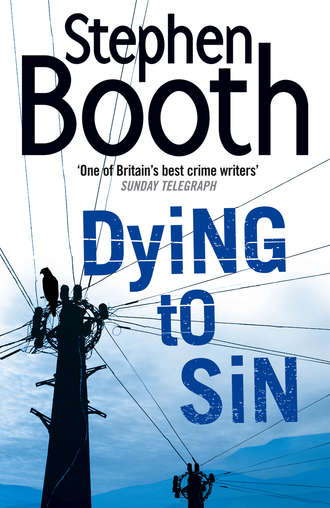
Полная версия
Dying to Sin
‘Saponification. It’s a factor that can affect a body after burial, especially if it’s buried in a moist area or directly exposed to water and kept free of air. The fatty tissues of the body turn into adipocere. That’s the greyish, waxlike substance you can see.’
It was that unnatural greyness that Fry would remember most about the victim at Pity Wood Farm. There was a big difference between a violent death and a natural death, between the killing of another human being and death as part of life. The latter she’d come to accept. The former she never would.
Cooper found himself drawn back into the farmhouse by some irresistible urge. It was if the house was calling to him, coaxing him into its rooms so it could tell him its story.
This time, he noticed that the whole kitchen had a curious yellow tinge. The wallpaper above the table might have been lemon once, and the cupboards were made of that golden pine which never seemed to darken completely. But there was also a sort of patina over the ceiling and the walls, particularly near the armchairs. Cooper guessed the Sutton brothers must have been heavy smokers. He could picture them sitting in those two armchairs in the evening, one either side of the fireplace. They would be puffing away, not talking to each other much, if at all. Thinking their own thoughts, but keeping those thoughts to themselves.
Turning away from the kitchen to look back into the sitting room, Cooper found himself disorientated. With the black range and the dripping tap behind him, and the smell of paint and fresh cement in front of him, he felt as though he was standing on the threshold between two worlds. For a moment, he wasn’t sure whether he was standing in the present, looking back into the vanished past, or somehow occupying a brief second of history, sharing the forgotten warmth of the Suttons’ kitchen while getting a glimpse of the future.
He wished he could pin down his sense of life and the lack of it, why some of the rooms were different from others. He was sure there were no scientific data that would back up his impressions. It was more a question of a feeling in the walls, a faint gleam that reflected the generations who’d survived an uncomplicated existence here, accepting life and death as it came. So why was that feeling lacking in some parts of Pity Wood Farm? Why was the gleam missing from the kitchen, why did the shadows seem blacker and more permanent in that middle bedroom on the first floor?
Outside, it was getting dark quickly. No surprise, since it was almost the shortest day of the year. At this time of year, darkness snuck up on you almost without you noticing, so that suddenly it was pitch black. Cooper could just make out the corrugated-iron roof of the shed and the faint gleam of the cars parked in the yard. The mountain of silage bags seemed to be spreading dark shadows across the farm.
But someone had pulled their fingers out and got the floodlights up. Now, part of Pity Wood Farm was bathed in a yellow glare that turned the muddy ground into a corner of the Somme. Mud and trenches and decomposing bodies.
The anthropology team were still working, but Scenes of Crime had gone home for the night, and only a couple of uniformed officers were left on scene protection duty. Soon, the farm would be settling back into its ancient silence.
When darkness descended totally, all he could see beyond the floodlights were the distant, isolated lights of scattered farmhouses. There were no streetlights out here, not even on the B road down in the valley. There was no upward glow from the lights of a town to reflect off the sky. There were no towns near enough. Soon, the shadows would have taken over the world. Or the whole of Rakedale, at least.
To the south of the farm, Cooper could just see Pity Wood itself, or what was left of it. Dark clumps of trees, their bare branches dripping with rain. And from the direction of the big shed, the only sound he could hear was the incessant scratch, scratch, scratch against the corrugated-iron sides.
As if Fry didn’t have enough on her plate, Ben Cooper was behaving oddly. Well, even more oddly than usual. She could see him stopping periodically, and sniffing. Sometimes he even crouched and sniffed close to the ground. Quietly, she came up behind him, realizing that he was totally absorbed in whatever he was concentrating on. When he stopped to squat on the ground again, she tapped him on the shoulder.
‘Hey, what are you supposed to be? General Custer’s Red Indian guide?’
Cooper almost overbalanced, and had to push a hand palm down in the mud to stop himself falling.
‘Oh, for – Diane, don’t do that.’
She found him a clean tissue in her pocket, noting that he’d been so taken by surprise that he didn’t even bother to correct her inappropriate use of the term ‘Red Indian’.
‘What’s with all the sniffing?’
‘There’s a strange smell in this area,’ said Cooper. ‘I thought at first it was just cat urine, but there’s more to it than that.’
‘It’s a farm,’ said Fry. ‘Farms have smells like dogs have fleas. Haven’t you noticed that before?’
‘Not a livestock kind of smell. It’s a chemical odour. Ammonia, but something else too.’
‘This must have been the machinery shed. There’d be diesel, lubricating oil. Damn it, there must have been fertilizer and herbicides, too. Disinfectant – all kinds of chemicals. What’s one whiff among friends?’
‘Can you actually smell it?’ asked Cooper.
‘No. But, then, I think I’m getting a cold.’ Fry turned her face up to the drizzle that had started while they were speaking. ‘And if I stand out here much longer, it’ll be pneumonia.’
Fry sent Cooper to see if the DI needed anything doing before he went off duty. She shook her head as she watched him go, despairing at her inability to understand him, even now.
There were so many things about Cooper that bothered her. She was aggravated by his tendency to look hot and flustered, as if he’d only just got out of bed. These days, he’d probably been in bed with that SOCO, Liz Petty. Or maybe it was just the stress of running from one obsession to another. At least he didn’t look quite so dishevelled as he used to, so maybe he’d learned to wash and iron for himself since he moved out of the family farm into his little flat at Welbeck Street.
When she first met him, Fry had mostly been struck by that disarray and by his air of innocence, which was lacking in those around him. He looked as though he’d hardly left the sixth form at High Peak College. Now, she wasn’t so sure whether what she saw was innocence any more. For a start, his hair wasn’t quite so untidy. It no longer fell over his forehead, but had been styled. His tie still needed straightening, though, and that scuff mark had been on his leather jacket for months.
She looked up as Cooper’s car passed, catching his profile as he drove by. In retrospect, it was amazing that he’d ever seemed innocent at all.
Fry recalled the day he’d told her about his father, Sergeant Joe Cooper, and his death on the streets of Edendale at the hands of a gang of thugs. ‘Three of them got two years for manslaughter, the others were put on probation for affray. First-time offenders, you see. Of course, they were all drunk too.’ And then there had been his mother, the psychiatric illness and the complications that had taken her life only a few months ago, with Ben at her bedside in the nursing home.
Fry wanted to be fair to him, she really did. In the circumstances, she supposed it was surprising that Cooper still retained a positive outlook on life at all, let alone the concern he so often showed for the problems of other people. He ought to be cynical. He ought to have grown as cynical as she was herself. She wondered how he managed to avoid it.
Before she left Pity Wood, Fry took another look inside the inner cordon to see how work on the remains was progressing. Under the floodlights, the shadows of the diggers against the sides of the PVC tent. The body was emerging bit by bit, but it was a painstaking job.
Something dark and fibrous in the soil caught Fry’s attention. She couldn’t make out what it was at first. Then she realized it was a hank of black hair that had become detached from the head.
In a way, she found it more bearable when a corpse had started to decompose. At least it definitely looked dead. Fresh bodies were more disturbing, because they still had the look of life about them, as if they might spring up at any moment and carry on as normal. At those times, it was hard to be unaffected by the most distinctive things about a dead body – the coldness, the utter stillness, and the knowledge that a human life had just been snuffed out an hour, or even a few minutes, before you arrived.
In other ways, a body left in a shallow grave for years, undiscovered and unidentified, was the saddest sort of case. Somewhere, there must be family and friends, wondering even now what had happened to this woman.
Fry knew that hand would live in her memory for a while. It was bent into a gesture, welcoming, almost inviting. It was as if the dead woman was greeting her visitors, enticing them down into her grave.
She’d waited a long time to have company. And it must have been lonely down there.
6
Oh, I’m a man from a distant land,
A place where camels roam
It’s hot and flat, and dry as bone
And if they don’t like your face, they’ll cut off your hand
It’s the place that I call home!
The Pedlar turned to the chorus, who joined in with the song. They were all dressed as Chinese peasants – colourful tunics and coolie hats. Within minutes, the scene had shifted to the street outside Widow Twankey’s house, which meant the Emperor Ping Pong would soon arrive with his beautiful daughter.
Edendale’s Royal Theatre was full for the highlight event of the year, the annual Christmas pantomime. Ben Cooper was sitting several rows back from the stage, behind dozens of excited children waiting for the chance to boo and hiss and shout ‘Oh no, you didn’t’ at any opportunity.
There were many variations on the script for Aladdin, but Eden Valley Operatic Society seemed to have opted for one of the more politically incorrect versions. Not that there was such a thing as a politically correct Aladdin, with the characters of Wishy Washy and Inspector Chu of the Chinese Police Force. But he was particularly doubtful about Abdulla O’Reilly, listed in the programme as ‘an Irish half-wit’. And then there was Ugga-Wugga, chief of the cannibal tribe.
Cooper squirmed in his seat. Criminal investigations had been launched for less blatant examples of racist humour. But this was panto, and it was traditional. Surely no one came into the theatre without having a good idea what to expect? Cheap jokes, comic names, a cheerful confusion of racial stereotypes.
In the next seat, Liz nudged him and whispered. ‘Ben, have you had a think about coming to my parents’ on Christmas Day?’
‘No,’ hissed Cooper back.
‘No, you haven’t had a think? Or no, you’re not going to come?’
‘We’ll talk about it later.’
‘Oh, yes. You’re always so busy, though.’
A chorus of boos heralded the first arrival on stage of the wicked wizard, Abanazar. Within seconds, it was clear that he was being played pretty much as an evil Arab who’d accidentally wandered into a Chinese city. It certainly gave an extra edge to the lines of the opening song: ‘And if they don’t like your face, they’ll cut off your hand.’
Cooper settled a bit lower on his seat, hoping not to be recognized. Some hopes. He’d already been greeted by a dozen acquaintances as he came through the lobby.
Liz nudged him again. ‘What’s the matter?’
‘Nothing.’
‘You look shifty.’
‘Thanks.’
‘Aren’t you enjoying it?’
‘Yes, it’s great.’
‘Only, we can’t leave. Not until after my friends have been on for their bit. They’re Chinese policemen, and they don’t appear until halfway through Act Two.’
Oh, God. The Chinese policemen. There were bound to be a few bobby jokes, and people would be looking at him when they laughed.
‘No, I’m fine, I don’t want to leave. Stop talking, or people will get annoyed with us.’
Every panto had its stock characters. There was always a very obvious villain – in this case, Abanazar, who had a large and challenging role, especially if he was going to carry off that turban and scimitar convincingly. And, of course, there was the pantomime dame. This Widow Twankey ran a Chinese laundry in the time-honoured way, allowing for the usual hoary old jokes about being closed for sock-taking, and so on.
Cooper turned to his programme, squinting to read the print in the subdued light of the theatre. Many of the names of the cast were familiar to him. If he didn’t know the performers themselves, he’d often come across their parents. Or, in the case of the children’s chorus, their grandparents. But most of them were individuals he’d made contact with in a positive way. Pantomime seemed to attract the respectable classes.
‘What are you thinking about, Ben?’
‘Nothing,’ he whispered. ‘I’m just looking at the programme.’
‘You’re not thinking about work?’
‘No, of course not.’
‘No “of course” about it. I know you.’
Reading down the list, Cooper found the names of the Chinese police officers. Apart from Inspector Chu, the performers were women. Their names were all local, too – Beeley, Holmes, Wragg, Marsden, Brindley. The latter was probably related to the actor playing Abanazar, since they had the same surname. He wasn’t sure which of them he was supposed to be watching out for.
‘Liz, what are your friends called again?’
‘Cheryl Hague and Harriet Marsden.’
‘Hague? Do I know her?’
‘Probably.’
‘Is she the attractive blonde we met in the pub last week?’
‘Hey. I thought you said not to talk.’
A storm of booing and jeering greeted Abanazar as he grasped the magic lamp triumphantly and rolled an artificial rock across the cave entrance to entomb Aladdin. That meant there would be a genie making his appearance soon.
Cooper glanced at Liz, but she was completely absorbed. And she was right, she was starting to know him. They’d been going out for a few months now, a lot longer than any previous girlfriend had lasted. One of the things he liked was that he discovered new aspects of her character all the time, and glimpsed unsuspected parts of her life. She surprised him constantly. This year, she’d even bought a Christmas present for his cat.
And he hadn’t realized Liz was interested in pantomimes until a few days ago. He supposed he was lucky she wasn’t actually up there on stage in a costume. God forbid, she might even try to persuade him to join the cast.
Cooper shuddered, then pulled his jacket closer, trying to give the impression he was cold rather than filled with revulsion.
‘Are you sure you’re OK, Ben?’
‘Absolutely fine. Loving every minute.’
And here they came, at last – the comedy policemen. A little troop of them, six or seven women of various sizes wearing tunics and tights, and carrying little comic truncheons. Their drooping Fu Manchu moustaches made them unrecognizable, but Liz seemed happy to cheer them indiscriminately.
Well, perhaps they’d actually arrest the villain and Cooper could cheer, too. But in the meantime, they had to get through a few more awful jokes.
When Aladdin was over, they squeezed out of the theatre with the crowds, hoping to find somewhere to eat before all the restaurants filled up. It wasn’t the first Aladdin Cooper had been to. He remembered seeing the same show at the same theatre when he was a teenager. In fact, he thought he’d probably watched slightly different versions of it three or four times.
There were only a handful of traditional pantomimes, and they seemed to come round regularly, as if on a strict rota. Cinderella one year, Mother Goose the next. But he’d sometimes heard of different stories being used. Peter Pan, Sinbad the Sailor, Robinson Crusoe. Robinson Crusoe? A story with only two characters? Maybe he’d have to be a bit adventurous one year and seek out somewhere that was doing the show, to see how they bent the plot to introduce a pantomime dame on to a desert island.
In Victoria Park, the fair was in full swing. Among the fairground rides, a big wheel spun green lights across the park as it turned, and a carousel made the faces of the crowd glow with pink luminescence. Free mince pies and glasses of mulled wine were being handed out to visitors.
This was by far the busiest time of year in Edendale’s social calendar. There was an E Division pub crawl planned for later in the week. Another annual tradition. This year, the officers organizing it had settled on a theme – seasonal ales, which they intended to track down all over town. There were plenty to be found. Every year, the breweries produced beers like Rocking Rudolph, Hark and Black Christmas.
But Cooper wouldn’t get a chance to try them. He wouldn’t be with his colleagues on the pub crawl this week, as he might have been in previous years. His priorities had changed in the last twelve months. He wasn’t quite so single as he used to be.
‘Well, if you won’t come for Christmas with me, at least you won’t forget the baptism service on Sunday, will you?’ said Liz.
‘I’m looking forward to it. Yes, honestly.’
Liz’s best friend had married a gym instructor two years ago, and their first baby was being baptized in Edendale on Sunday. He always thought ‘first baby’ when the subject came up, because he’d met the friend and he sensed she was the sort of woman who intended to have lots of children.
‘It’s church, so everybody will be dressed up, Ben.’
‘Yes?’
‘You do have a suit and tie, don’t you?’
‘Oh, er … absolutely.’
Cooper thought of his brother squeezing into a suit for the first time this year. Now that he was too old to attend the Young Farmers’ Club Christmas Ball, Matt’s only social occasion had been the end-of-term nativity play at Josie’s primary school. Unlike the pantomime, this production had varied the usual plot. There had been no appearances by Mary or Joseph. In fact, there wasn’t even a role for the baby Jesus. Instead, the nativity story had been told from the point of view of the Bethlehem inn keeper and his family, exploring the impact on their lives. Having to deal with a sudden influx of shepherds and wise men, for a start. Well, lots of Peak District landlords would sympathize with the difficulty of mixing tourists with the locals.
Matt hadn’t been impressed by the production, though. He was turning into a real diehard traditionalist as he aged. New ideas upset him.
Later this week, Ben would be singing with the police male voice choir in the Methodist church, a concert for senior citizens, followed by a children’s party. The old folk loved it, though, especially around Christmas time. It was good PR, too.
Cooper recalled when he’d first met Diane Fry on her transfer to Derbyshire from West Midlands Police. She’d been scornful of everything in those days, so prickly that he soon developed the habit of letting her comments go by unnoticed. When he’d told her about singing in the choir, she had been predictably derisive. ‘Do you sing soprano?’ she’d asked. ‘No. Tenor.’ And he hadn’t even seen the barb until much later.
Oh, well. Fry had mellowed a bit since then, hadn’t she? Surely she had. Cooper frowned slightly. There was always the possibility that he’d just become very good at letting everything pass him by.
When he lifted his hand off the gear stick, Liz took his fingers for a moment and held them gently.
‘Thanks for coming to the panto with me, Ben.’
On the road out of town that night, taking Liz home to Bakewell, Cooper felt content. Below him, the sprawling outline of Edendale was marked by a network of lights, but most of the Peak District lay in darkness. After all that had happened in his life, things seemed to be coming right at last. He’d found someone he cared about. And, above all, he was in the only place he’d ever wanted to live in the world.
With a surge of blind rage, Diane Fry grabbed her sister’s arm and dragged her back, pulling her off balance and throwing her on to the bed.
‘Hey!’ gasped Angie, shocked by the sudden violence.
‘Angie, what the hell are you up to?’
Diane could hear her voice coming out in a spiteful hiss. It sounded awful, but she couldn’t have changed it. Her throat was too tightly constricted by the flood of emotions overwhelming her. Anger, bitterness, a sense of betrayal. And other emotions she’d never experienced before, too fleeting to be pinned down and named.
‘Me?’ Angie tried to laugh it off, sitting up on the bed and straightening her sleeve as if it were just a family game, a bit of rough and tumble between siblings. ‘Sis, you know I’m always up to something. The original problem kid, that’s me.’
‘I’m not joking here. I want to know what you think you’re doing.’
‘Come on, Di. Lighten up.’
Diane felt herself flushing angrily. She’d told herself she wouldn’t get angry with her sister. But here it was, all that rage, bubbling just below the surface. Anything could release it, a wrong word or an unguarded expression.
‘Don’t try to get round me, Angie,’ she said. ‘Just don’t try it. It might have worked once, but it doesn’t work on me now. Things have changed between us. I’m not your kid sister any more.’
‘Oh, really?’
‘Yes, really. You’ve got to start understanding that, or there’s no future between us.’
‘But that was always true, wasn’t it?’ snapped Angie. ‘We never had any future between us.’
‘What do you mean?’
‘We have a past, that’s all. That’s the only thing we share, the one factor we have in common. And that’s all it is – the past. We’d never have stayed together, Di. I know you couldn’t see it at the time, but I was always going to go my own way, and it wasn’t the same as yours. We’d have split up pretty soon, and you’d have gone off to your college and your police training feeling ashamed of your big sister. You ought to thank me for what I did. It was much the best way.’
Diane felt the anger draining from her. It was replaced by a strange chill that crept over her skin, like the first indications of approaching flu.
‘But we’re back together again now. We have to think about what sort of future there’s going to be,’ she said. ‘We have to sort some things out to make that future work.’
Angie got up from the bed, and Diane backed away to put some distance between them.
‘You haven’t been listening, have you?’ said Angie. ‘You just hear whatever you want to. I just said we have no future. Not just back then, but now, too. We have nothing in common, Di. And we never will have. If you imagine any different, you’re fooling yourself.’
‘No, you’re wrong.’
‘Oh dear. It doesn’t fit the image, does it? Had you built up some nice, rosy picture of Angie and Di settling down together, sharing girly chats about boyfriends and babies? Holding each other’s hands when we need a good cry, giggling in bed together over a couple of good books? It ain’t going to happen, Sis. So it’s about time you faced up to the real world.’
‘Look, I know you’ve changed. God knows, I’ve made allowances for that. All those years we were apart, we were bound to go our different ways –’
‘Changed? You’re damn right. Yes, I’m the one who’s grown up. I grew up a long time ago.’
‘Oh, yes? Using heroin isn’t a sign of being grown up, you know.’
‘Fuck off.’
Diane took a step forward. She saw Angie begin to edge towards the door, and realized that her sister was actually scared of her. The physical outburst a few minutes ago had taken Angie by surprise and frightened her a little. She, too, had things to discover about her kid sister that she might not like very much.


